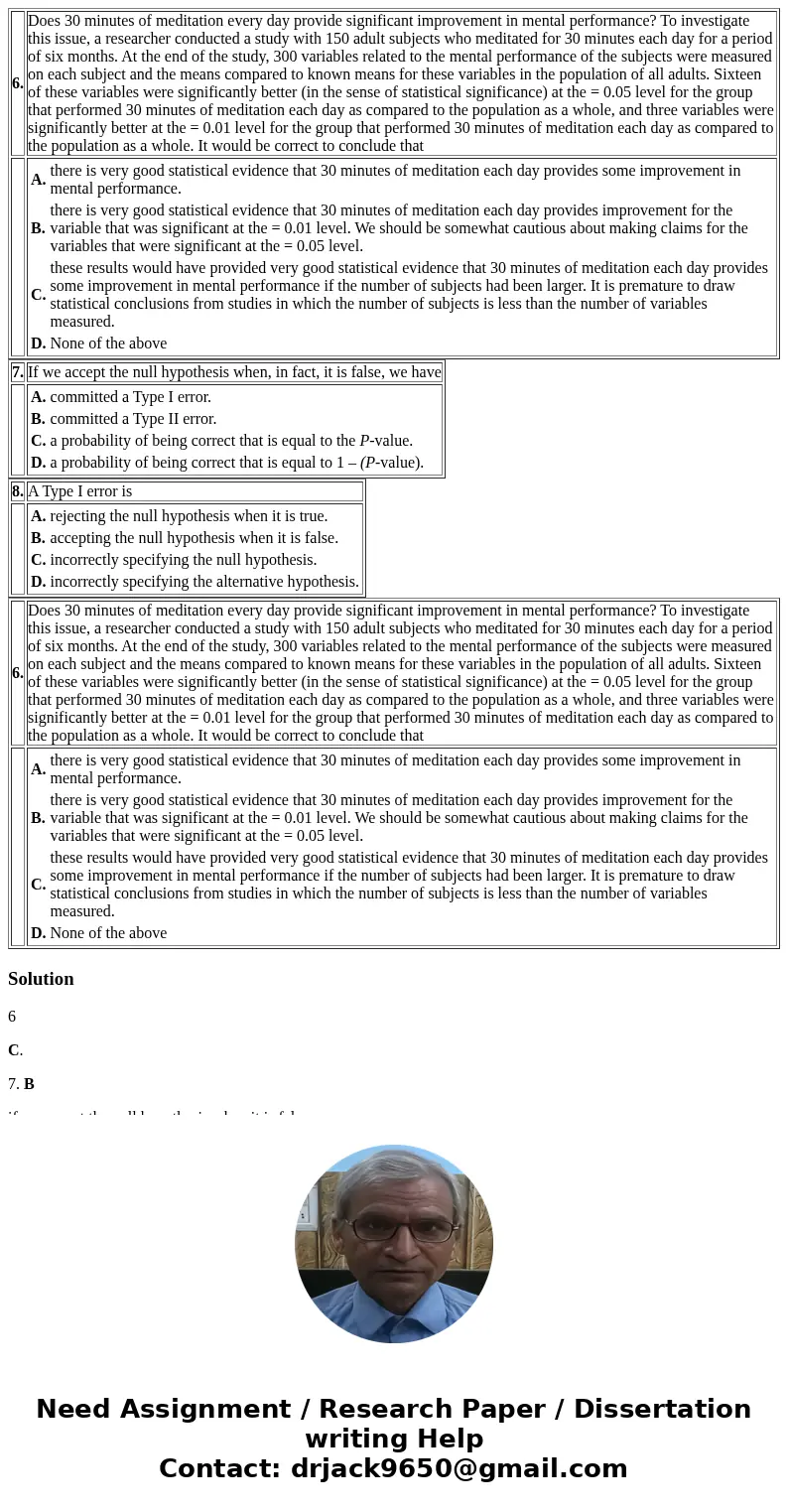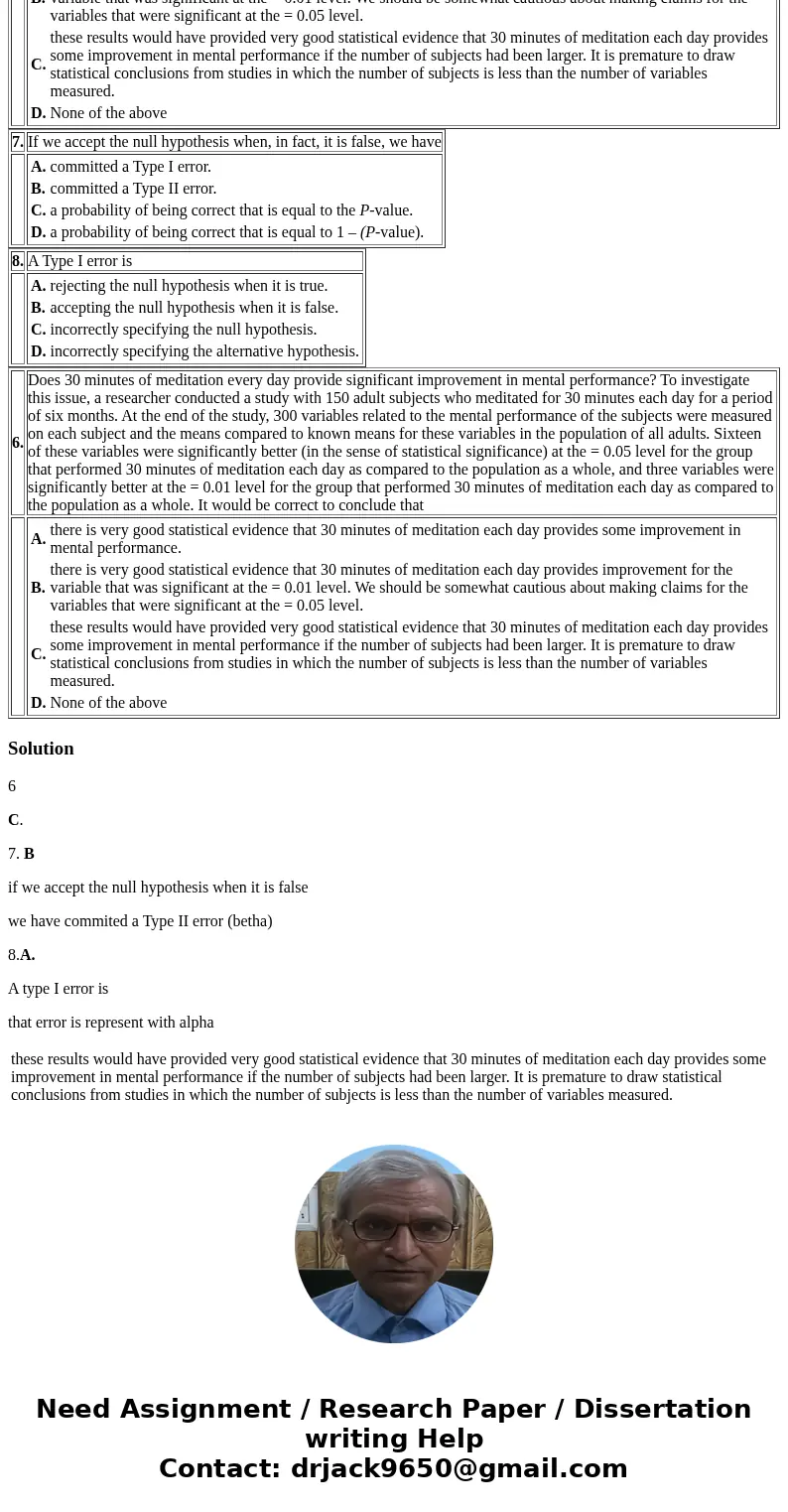| 6. | Does 30 minutes of meditation every day provide significant improvement in mental performance? To investigate this issue, a researcher conducted a study with 150 adult subjects who meditated for 30 minutes each day for a period of six months. At the end of the study, 300 variables related to the mental performance of the subjects were measured on each subject and the means compared to known means for these variables in the population of all adults. Sixteen of these variables were significantly better (in the sense of statistical significance) at the = 0.05 level for the group that performed 30 minutes of meditation each day as compared to the population as a whole, and three variables were significantly better at the = 0.01 level for the group that performed 30 minutes of meditation each day as compared to the population as a whole. It would be correct to conclude that |
| | A. | there is very good statistical evidence that 30 minutes of meditation each day provides some improvement in mental performance. | | B. | there is very good statistical evidence that 30 minutes of meditation each day provides improvement for the variable that was significant at the = 0.01 level. We should be somewhat cautious about making claims for the variables that were significant at the = 0.05 level. | | C. | these results would have provided very good statistical evidence that 30 minutes of meditation each day provides some improvement in mental performance if the number of subjects had been larger. It is premature to draw statistical conclusions from studies in which the number of subjects is less than the number of variables measured. | | D. | None of the above | |
| 7. | If we accept the null hypothesis when, in fact, it is false, we have |
| | A. | committed a Type I error. | | B. | committed a Type II error. | | C. | a probability of being correct that is equal to the P-value. | | D. | a probability of being correct that is equal to 1 – (P-value). | |
| 8. | A Type I error is |
| | A. | rejecting the null hypothesis when it is true. | | B. | accepting the null hypothesis when it is false. | | C. | incorrectly specifying the null hypothesis. | | D. | incorrectly specifying the alternative hypothesis. | |
| 6. | Does 30 minutes of meditation every day provide significant improvement in mental performance? To investigate this issue, a researcher conducted a study with 150 adult subjects who meditated for 30 minutes each day for a period of six months. At the end of the study, 300 variables related to the mental performance of the subjects were measured on each subject and the means compared to known means for these variables in the population of all adults. Sixteen of these variables were significantly better (in the sense of statistical significance) at the = 0.05 level for the group that performed 30 minutes of meditation each day as compared to the population as a whole, and three variables were significantly better at the = 0.01 level for the group that performed 30 minutes of meditation each day as compared to the population as a whole. It would be correct to conclude that |
| | A. | there is very good statistical evidence that 30 minutes of meditation each day provides some improvement in mental performance. | | B. | there is very good statistical evidence that 30 minutes of meditation each day provides improvement for the variable that was significant at the = 0.01 level. We should be somewhat cautious about making claims for the variables that were significant at the = 0.05 level. | | C. | these results would have provided very good statistical evidence that 30 minutes of meditation each day provides some improvement in mental performance if the number of subjects had been larger. It is premature to draw statistical conclusions from studies in which the number of subjects is less than the number of variables measured. | | D. | None of the above | |
6
C.
7. B
if we accept the null hypothesis when it is false
we have commited a Type II error (betha)
8.A.
A type I error is
that error is represent with alpha
| these results would have provided very good statistical evidence that 30 minutes of meditation each day provides some improvement in mental performance if the number of subjects had been larger. It is premature to draw statistical conclusions from studies in which the number of subjects is less than the number of variables measured. |


 Homework Sourse
Homework Sourse